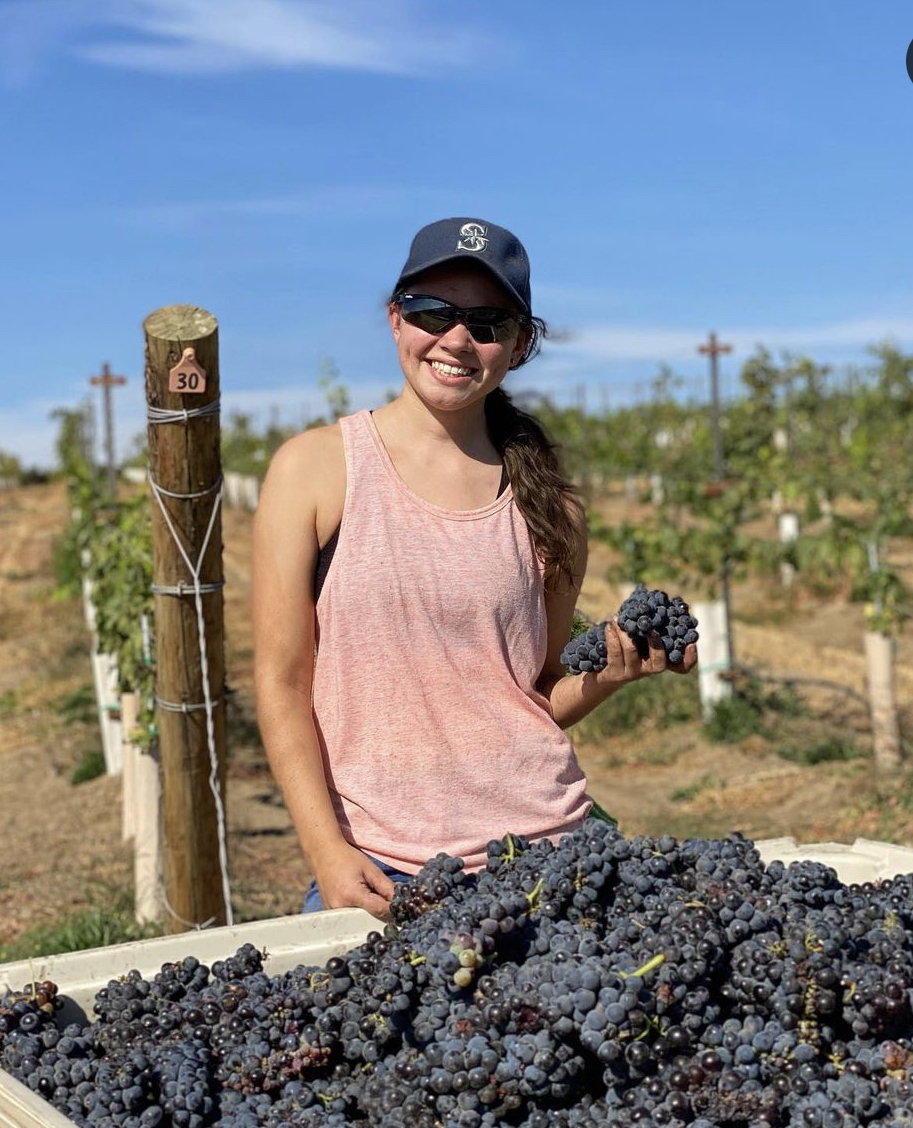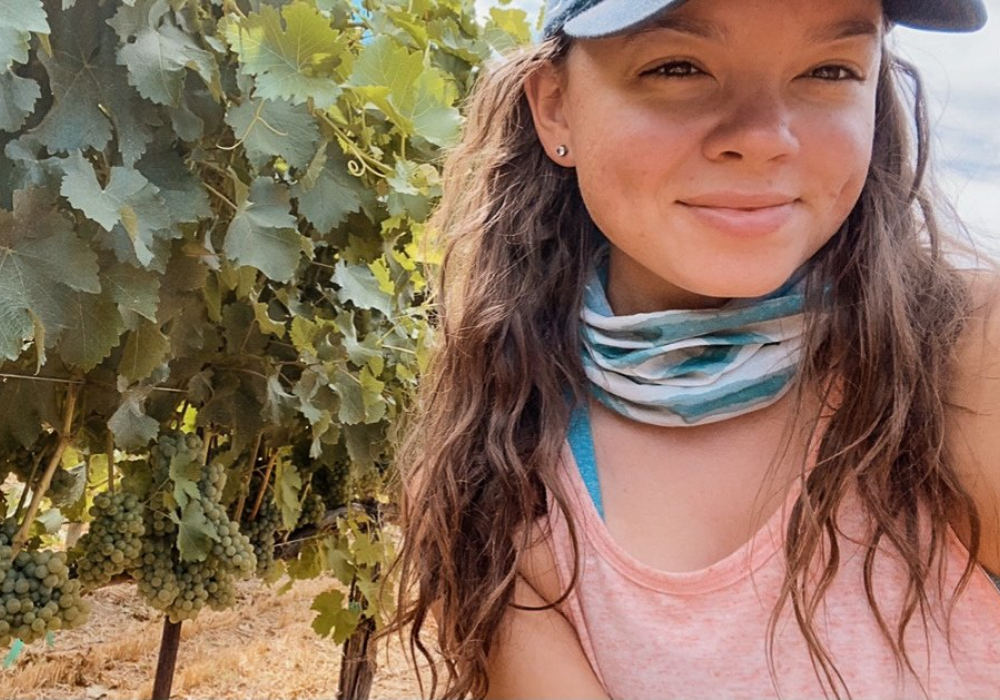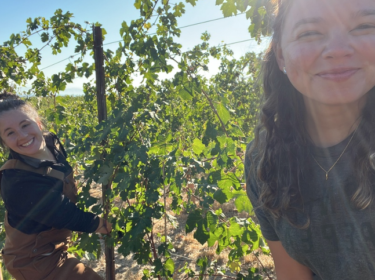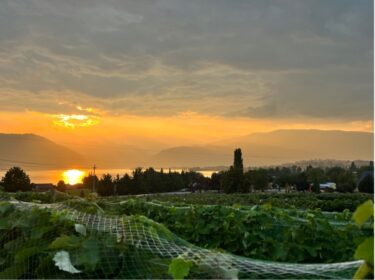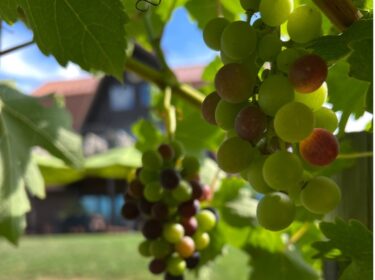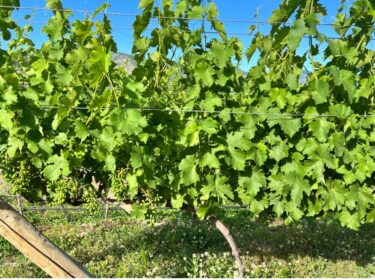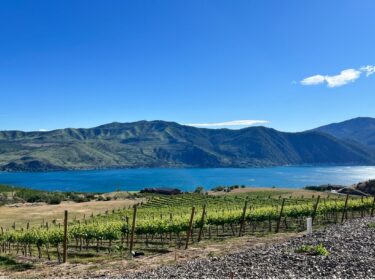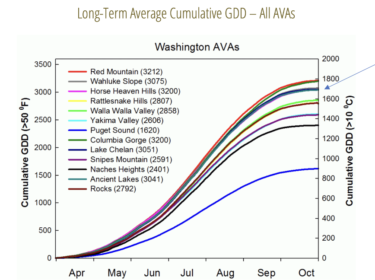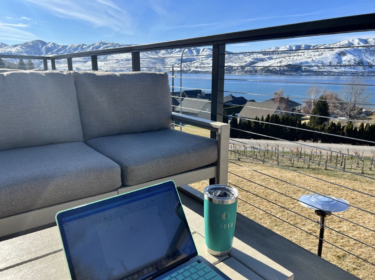“Este es el sueño. Mi corazón está tan feliz en este cortacésped ahora mismo.”
Meet Miriah Falce, Enologist at Cairdeas Winery in the Lake Chelan Wine Valley. Raised in Prosser, WA, Miriah is a traveler at heart. As a kid, she always had her eyes set on the city, and in between her studies and jobs, she takes to solo-traveling. “I’m not the biggest fan of traveling with people. I guess that’s my thing. I like to go to a new country every year. Everywhere I go, I like to taste the local wines. Right before COVID, I went to Egypt and I got to try Egyptian wines.” While she was initially surprised to find herself working not so far from home, it was the lab that first got her into wine, winemaking, and grape growing. “The moment I experienced the first truck arriving and grapes going through the hopper and into the press, it was the most amazing thing I’d ever seen. And then going through daily fermentation and winemaking with all the different varietals and just experiencing harvest, that’s when I knew. “New plan. This is what I want to do. I want to be a winemaker.”
There’s a lot of people involved that aren’t always talked about.—Miriah Falce, Cairdeas Winery
Translated by Rosanna Lugo
Washington Wine: Tell me about that dream of being where you are right now. Had you always wanted to get into farming or wine?
Miriah Falce: No, not at all. I grew up in Prosser, and thought, “I never want to live in the valley again. I’m going to move to Seattle and live the big city life.” I graduated with a Biomedical science degree from the University of New Mexico, returned home from abroad after 3 months, it was mid-summer, and I was a little broke.
I figured that while I applied for jobs in Seattle, I could make a little money and work at one of the local tasting rooms. I got a job at Milbrandt and met Emily Haines, Head Winemaker. She had the same medical degree that I did and reading her story really inspired me, especially as one my coworkers explained that I could apply science to wine. Here I was thinking it was farming because that’s what I grew up surrounded by. I started reading all the books I could find, I was learning about fermentation and yeast and all of the different lab tests, and I was like, “Oh, my gosh. This is literally what my degree is in. I can totally do this.”
By this time summer was ending, so I started reaching out and that’s how I got in at Willow Crest Estate Vineyard. Harvest had just begun, and they needed someone to run analysis. So that’s how I started: lab work. The moment I experienced the first truck arriving and grapes going through the hopper and into the press. It was the most amazing thing I’d ever seen. And then going through daily fermentation and winemaking with all the different varietals and just experiencing harvest, that’s when I knew. “New plan. This is what I want to do. I want to be a winemaker.”
I started a local certificate program because I really didn’t know much about wine, honestly, other than what I experienced that harvest. I completed that, earned a bigger role in the winery and then soon after joined the vineyard side as a Vit Technician. Brittany Komm, who’s also an ambassador on this program, needed help. She knew I knew the basics and said she would teach me the rest. I started that spring counting buds and as the seasons progressed learned how to scout for pests and disease. I found that I actually really loved this side, too, because the work I was doing in the vineyards was going to show itself in the winery in a couple months at harvest. I realized, especially after the initial Covid shutdown, that I was meant to be involved with the grapes. Everyone was sent home from their offices and was home, stuck inside, making sourdough bread, but agriculture doesn’t stop. I remember being completely alone on some of the farms, turning off my 4wheeler, sitting back under the sun, listening to the hawks above me and the breeze rustle the vines, and thinking how lucky I was to not only be experiencing this peace, but that it was what I was meant to do.
I feel like most growers don’t really go to the winery, and most winemakers don’t really go to the vineyard, it’s totally separate halves. I loved that I could do six months in the winery and six months in the vineyard. That I could literally go from bud to bottle. “I can do everything,” I realized, and that was the kind of winemaking I wanted to do. Small farming, small lot, involved equally in each half and making wine with soul. After spending vineyard time in Walla Walla I thought that might be where I wanted to end up.
I knew I wanted to be at a small winery so I kind of cold-called Lacey Lybecker at Cairdeas and said if they’re ever looking for someone that I’d be interested and sent my resume. I found out later that night at dinner, Charlie brought up that it might time to bring on an Enologist as they were continuing to grow. Lucky for me, Lacey had just seen my email.
I loved that I could do six months in the winery and six months in the vineyard. That I could literally go from bud to bottle.—Miriah Falce
Washington Wine: Is that when everything started?
Miriah: No, that was in February! He called me the next day and said he didn’t have room yet, but he just wanted to talk about my experience. Memorial Day weekend came, he gave me another call, and this time he said, “We have an opening.” I initially turned him down… then realized I was absolutely crazy so I called him back and said I can come meet that weekend. Then I saw Lake Chelan for the first time and knew without a doubt it was where I was meant to be, and the rest is history.
My first week I did a little bit of lab stuff with him, and a little bit of blending, which is the winemaking work I like and that I want to do. Then he handed me a big pair of loppers and tasked me with hedging the estate vineyard so they could spray. It was unbelievably hot and I was out there pouring sweat while trimming the vines and yeah, today I’m mowing. We’re moving furniture into the new tasting room and also putting down sand and oyster shells. I feel like I get to do it all here, I know that I want to do grape to glass, and I’m so lucky to work in a place where I can do that.
WW: So what is your exact role, or title, going to be at Cairdeas?
Miriah: I’m their Enologist, which means I am in charge of the lab—the science stuff—but because they are a smaller winery I’m also kind of doing everything. I’m not just stuck in a lab all day. I do get to help Charlie with the winemaking, so I’ll be out on the crush pad with fruit, and we hand-pick here, so I’ll be helping with that. Charlie is the winemaker and Lacey’s brother Charles manages the vineyard and I’ll be helping him as much as I can. Wherever they need help, I go. And since I first started in the tasting room, I’m hoping to help with wine club events, pack wine releases, and so on. Technically, an Enologist is the person in charge of science, and I’ll get to do that, but also so much more. I like having my hands in everything.
Wherever they need help, I go.—Miriah falce
WW: How common is that? To be involved from grape to glass, or berry to bottle, as you put it?
Miriah: It’s funny, last week I walked into the tasting room to refill my water bottle, shirt soaked and sweat dripping down my back, and overheard a customer having a conversation with one of the girls behind the bar. He was asking her about winemaking and growing grapes. He said something like, “So you trim back the vines? What does that do?” and she burst out laughing and pointed at me. “Well, that’s what this girl was just out there doing! She could explain.” I got to spend a few minutes talking to him about what we do in the vines and why. Being involved in the whole process allows you to really educate people and give them unique vineyard knowledge, but also share production knowledge about the creation of the glass in their hand. I feel like a lot of people don’t have that opportunity. I mean, people in Washington tend to know more than your average drinker, but it’s fun being able to share with guests that personal experience.
We get to say “Yeah, I was just out there mowing,” or, “We just saw veraison today.” People will ask what veraison is, and that’s another opportunity to tell the story of what’s going on with the grapes and give them some context for what they’re experiencing. It’s cool being able to do that. I wouldn’t say it’s very common. Definitely more so at smaller wineries than corporate or big facilities. But to do both farming and winemaking you’d have to have an estate vineyard. I think it’s more common for a person to specialize in one aspect and go all in with that.
WW: It seems like you get to a show a very different side to making wine.
Miriah: Winemaking and wine can be very romanticized, but those days when it was 115 degrees, we could only work in the vineyards until 9:30am because it was already 100. Those days sucked. And then when it’s only 95, those days kind of suck too because you’re in it all day. There’s so much more to the process than just what people typically think of grapes when they’re visiting a tasting room. I don’t think people understand pruning the vines in the cold of winter, working in the spring rains, the summer heat, etc. How much dedication and hard work the field crews put into the vineyards. So while I do think it is romanticized. I will still say it is also the most magical thing to be a part of.
WW: What does your ordinary day or week look like? Is it early morning, long days?
Miriah: It’s definitely changed now that I’m here, and everything changes with harvest. That’s a whole different beast. Last year I ran the crush pad, and for half of that time it was at night, so 11:00 pm until noon, with 24 tons of grapes every three hours. My schedule was just completely different and I felt like I didn’t know what was going on with the wine. Those days, I missed doing the yeast additions and I missed all the fun fermentation work because well, I can’t work 24 hours a day. Then back on day shift everyone is still doing 12-hour days with maybe an afternoon off. You have no life during harvest, which my friends with regular jobs still don’t understand. The universal thing about harvest is it doesn’t matter if you’re a big facility or you’re small. You know you’re going to work a lot.
During the year, the summer tends to be slowest season for the winemaking team but the busiest for the vineyard, because that’s when you’re in peak ripening season. You’re making sure everything’s going as it should and everything’s healthy. And then the season kind of flip-flops, which is one rough thing, since I want to do both and won’t really have a down season. The vines are sleeping in the snow but the winemakers are racking, blending, barreling down, and running trials. But right now I start in the morning. Not at 6:30 like I used. Now, I can start at 8:00 and have some coffee.
The universal thing about harvest is it doesn’t matter if you’re a big facility or you’re small.—Miriah Falce
WW: Have some coffee, hop on a tractor. No big deal. Until harvest, of course.
Miriah: Exactly. And it’s not like you can plan harvest. You have a vague idea, but you don’t really know exactly how fast and when the grapes are going to ripen, or if grape maturity and flavors are on the same track for that ideal ripeness. Or, if you want to pick a varietal at a certain sugar ripeness, tracking when you think it will happen while also trying to plan tank space and all your other ferments. Or if you have one grower who wants to pick while you’re trying to get grapes from another grower and trying to figure how you’ll get it all in the press in a day. It’s all a day-by-day kind of thing, or maybe week-by-week.
WW: Right, and I imagine the pandemic hasn’t made that uncertainty any easier.
Miriah: Totally. There’s not really a “typical” year anymore. Maybe there never was.
WW: That’s some truth right there. So tell me, outside of wine and farming, who is Miriah? What’s something people don’t know about you? What makes you tick? What do you love doing? In all that spare time that you have.
Miriah: My biggest thing, pre-pandemic, was traveling. Solo traveling because I’m not the biggest fan of travelling with people. I guess that’s my thing. I like to go to a new country every year. Everywhere I go, I like to taste the local wines. Right before COVID, I went to Egypt and I got to try Egyptian wines which were…interesting. I also like to read a lot.
WW: Is that how you reset yourself? The solo trips?
Miriah: Oh my gosh, yes. Usually, I do it between May and June. I don’t know what it is during that time of year but that’s just when I’m like, “I need to reset.” I don’t know if it’s going into summer or if it’s just because the year has been long. I just pack my backpack and I decide where I’m going, then I go.
WW: What kinds of stories are you wanting to see out there?
Miriah: I think people really don’t have an idea of what goes on in the vineyards. You see them when you’re driving through the countryside, or you’ll attend a fancy dinner in one with a winemaker, but I feel like no one really knows about Vit Techs, how crews work, or all of the tasks that go on throughout the growing season. Not that it’s not deserved, but I feel like usually the focus is aimed at the wineries and the winemakers. And they just happen to have really good grapes that make good wine because that’s what Washington does. But it starts in January when people are out pruning in the freezing cold temps. That’s when the season starts. So yeah, I’m excited for people to have access to more of it.
Most people know the winemaker at their favorite winery. Some might know a popular vineyard or owner. I’m excited for people to learn about the smaller growers. The crews, like Jaime, and the students like Bernadette, who is also in this program, who study the vines and are helping progress root stocks and smoke effect. There’s a lot of people involved that aren’t always talked about. So, I think this is a good way to get everyone talked about. The average wine drinker doesn’t think about the PhD student who is out planting tomatoes in order to fight nematodes in the soil. But those things help put Washington on the map and it’s helping make Washington wines even greater.
Everyone makes Washington wine great in their own way, no matter their role in the industry, but great wine starts in these vineyards and the hands that give them time, attention, and care.
Everyone makes Washington wine great in their own way, no matter their role in the industry, but great wine starts in the vineyards and the hands that give them time, attention, and care.—Miriah Falce, Cairdeas Winery
Traducido por Rosanna Lugo
Washington Wine: Háblame de ese sueño. ¿Siempre había querido dedicarse a la agricultura o al vino?
Miriah Falce: No, en absoluto. Crecí en Prosser y pensé: “No quiero volver a vivir en el valle nunca más. Me mudaré a Seattle y viviré la vida de la gran ciudad”. Me gradué de la universidad, regresé a casa después de 3 meses en el extranjero, era mediados de verano y estaba un poco sin dinero.
Pensé que mientras solicitaba trabajo en Seattle, podría ganar un poco de dinero y trabajar en una de las salas de degustación locales. Conseguí un trabajo en Milbrandt y conocí a Emily Haines, enóloga jefa. Tenía el mismo título de médico que yo y leer su historia realmente me inspiró, especialmente cuando uno de mis compañeros de trabajo me explicó que podía aplicar la ciencia al vino. Y yo, aquí estaba pensando que era la agricultura porque crecí rodeada de eso. Empecé a leer todos los libros que pude encontrar, estaba aprendiendo sobre la fermentación y la levadura y todas las diferentes pruebas de laboratorio, y estaba como, “Oh, Dios mío. Esto es literalmente en lo que está mi título. Puedo hacer esto totalmente.”
Para entonces, el verano estaba terminando, así que comencé hacer contactos y así fue como entré en Willow Crest con Jon Z. La cosecha acababa de comenzar y necesitaban a alguien para realizar el análisis. Así es como empecé: trabajo de laboratorio. El momento en que vi llegar el primer camión y las uvas pasar por la tolva y entrar en la prensa… fue lo más increíble que había visto en mi vida. Y luego, pasando por la fermentación diaria y la vinificación con todas las diferentes variedades y simplemente experimentando la cosecha, fue cuando lo supe. “Nuevo plan. Esto es lo que quiero hacer. Quiero ser enólogo”.
Comencé un programa de certificación local porque realmente no sabía mucho sobre vino, honestamente, aparte de lo que experimenté en esa cosecha. Completé eso, gané un papel más importante en la bodega y poco después me uní al lado del viñedo como Vit Tech. Brittany Komm necesitaba ayuda, sabía que yo sabía lo básico y dijo que me enseñaría el resto.
Comencé esa primavera contando brotes y, a medida que avanzaban la temporada, aprendí a buscar plagas y enfermedades. Descubrí que en realidad también me encantaba este lado, porque el trabajo que estaba haciendo en los viñedos se iba a mostrar en la bodega en un par de meses después de la cosecha. Siento que la mayoría de los cultivadores no van realmente a la bodega, y la mayoría de los enólogos no van realmente al viñedo, son mitades totalmente separadas. Me encantó que pude hacer seis meses en la bodega y seis meses en el viñedo. Que literalmente podría pasar del broto a la botella. “Puedo hacer de todo”, me di cuenta, y ese era el tipo de vinificación que quería hacer. Pequeña agricultura, pequeño lote, implicados por igual en cada mitad y haciendo vino con passion/animo. Después de pasar un tiempo en los viñedos de Walla Walla, pensé que podría ser donde quería terminar.
Sabía que quería estar en una pequeña bodega, así que me comunique con Lacey Lybecker en Cairdeas y les dije que, si alguna vez buscaban a alguien, me interesaría y les envié mi currículum. Me enteré más tarde esa noche en la cena, Charlie mencionó que podría ser el momento de traer a un enólogo ya que seguían creciendo. Por suerte para mí, Lacey acababa de ver mi correo electrónico.
Me encantó que pude hacer seis meses en la bodega y seis meses en el viñedo. Que literalmente podria pasar del broto a la botella.—Miriah Falce
WW: Hable acerca de la casualidad, y simplemente un gran momento. ¿Fue entonces cuando todo empezó? ¿En ese momento y allí?
MF: ¡No, eso fue en febrero! Me llamó al día siguiente y me dijo que todavía no tenía espacio, pero que solo quería hablar sobre mi experiencia. Llegó el fin de semana del Día Conmemorativo, me volvió a llamar y esta vez me dijo: “Tenemos una vacante”. Inicialmente lo rechacé… luego me di cuenta de que estaba absolutamente loca, así que lo llamé de nuevo y le dije que podía reunirme ese fin de semana. Entonces vi el lago Chelan por primera vez y supe sin lugar a dudas que era donde debía estar, y el resto es historia.
Mi primera semana hice un poco de trabajo de laboratorio con él y un poco de mezcla, que es el trabajo de vinificación que me gusta y que quiero hacer. Luego me entregó un gran par de tijeras de podar y me encargó que podara el viñedo de la propiedad para que pudieran rociar. La semana pasada [agosto], hacía un calor increíble y estaba sudando mientras podaba, y sí, hoy estoy cortando el césped/pasto. Estamos trasladando muebles a la nueva sala de degustación y también colocando arena y conchas de ostras. Siento que puedo hacerlo todo aquí, sé que quiero hacer de la uva al vaso, y tengo mucha suerte de trabajar en un lugar donde puedo hacer eso.
WW: Entonces, ¿cuál es exactamente su función o título en Cairdeas?
MF: Soy su enólogo, lo que significa que estoy a cargo del laboratorio, las cosas científicas, pero debido a que son una bodega más pequeña, también estoy haciendo todo. No estoy atrapado en un laboratorio todo el día. Puedo ayudar a Charlie con la elaboración del vino, así que estaré en la almohadilla de aplastamiento con fruta, y cosechamos/piscamos a mano aquí, así que estaré ayudando con eso. Charlie es el enólogo y el hermano de Lacey, Charles, administra el viñedo y lo ayudaré en todo lo que pueda. Donde sea que necesiten ayuda, yo voy. Y como comencé en la sala de degustación, espero ayudar con los eventos del club de vinos, empaquetar lanzamientos de vinos, etc. Técnicamente, un enólogo es la persona a cargo de la ciencia, y podré hacer eso, pero también mucho más. Me gusta tener mis manos en todo.
Donde sea que necesiten ayuda, yo voy.—Miriah Falce
WW: ¿Qué tan común es eso? ¿Estar involucrado desde la uva hasta la copa, o desde la baya hasta la botella, como usted dice?
MF: Es curioso, la semana pasada entré en la sala de degustación para volver a llenar mi botella con agua, con la camisa empapada y el sudor goteando por mi espalda, y escuché a un cliente conversando con una de las chicas detrás de la barra. Él le estaba preguntando sobre la elaboración del vino y el cultivo de uvas. Dijo algo así como: “¿Así que podas las vides? ¿Qué hace eso?” y se echó a reír y me señaló. “Bueno, ¡eso es lo que estaba haciendo esta chica! Ella podría explicarlo”. Pasé unos minutos hablando con él sobre lo que hacemos en las vides y por qué. Estar involucrado en todo el proceso te permite educar realmente a las personas y brindarles conocimientos únicos sobre viñedos, pero también compartir conocimientos de producción sobre la creación del vaso en sus manos. Siento que mucha gente no tiene esa oportunidad. Quiero decir, la gente en Washington tiende a saber más que el bebedor promedio, pero es divertido poder compartir con los invitados esa experiencia personal.
Podemos decir “Sí, estaba cortando el césped/pasto” o “Acabamos de ver el envero hoy”. La gente preguntará qué es el envero, y esa es otra oportunidad para contar la historia de lo que está pasando con las uvas y darles un contexto de lo que están experimentando. Es genial poder hacer eso.
No diría que es muy común. Definitivamente más en bodegas más pequeñas que en instalaciones corporativas o grandes. Pero para hacer agricultura y vinificación, tendrías que tener un viñedo de propiedad. Creo que es más común que una persona se especialice en un aspecto y se dedique a eso.
WW: Parece que puedes mostrar un lado muy diferente de la vinificación.
MF: La vinificación y el vino pueden ser muy romantizados, pero esos días cuando hacía 115 grados, solo podíamos trabajar en los viñedos hasta las 9:30 am porque ya estaba 100. Esos días fueron malos. Y luego, cuando solo estaba 95, esos días también fueron malos porque estás en eso todo el día. Hay mucho más en el proceso que lo que la gente típicamente piensa de las uvas cuando visitan una sala de degustación. No creo que la gente entienda podar las vides con el frío del invierno, trabajar con las lluvias primaverales, el calor del verano, etc. Cuanta dedicación y trabajo ponen las cuadrillas en los viñedos. Entonces, si bien creo que es idealizado… Todavía diré que también es lo más mágico de lo que ser parte.
WW: ¿Cómo es tu día o semana normal? ¿Es temprano en la mañana, días largos?
MF: Definitivamente ha cambiado ahora que estoy aquí, y todo cambia con la cosecha. Esa es una bestia completamente diferente. El año pasado operé la almohadilla de aplastamiento, y durante la mitad de ese tiempo fue de noche, de 11:00 p. m. hasta el mediodía, con 24 toneladas de uvas cada tres horas. Mi horario era completamente diferente y sentí que no sabía qué estaba pasando con el vino. En esos días, extrañaba hacer las adiciones de levadura y extrañaba todo el divertido trabajo de fermentación porque bueno, no puedo trabajar las 24 horas del día. Luego, en el turno de día, todos siguen haciendo jornadas de 12 horas con tal vez una tarde libre. No tienes vida durante la cosecha, lo que mis amigos con trabajos regulares todavía no entienden. Lo universal acerca de la cosecha es que no importa si es una instalación grande o pequeña. Sabes que vas a trabajar mucho.
Durante el año, el verano tiende a ser la temporada más lenta para el equipo de vinicultores, pero la más activa para el viñedo, porque es cuando se está en la temporada alta de maduración. Te estás asegurando de que todo vaya como debería y que todo esté saludable. Y luego todo cambia con la temporada, que es algo difícil, ya que quiero hacer ambas cosas y realmente no tendré una temporada baja. Las vides están durmiendo en la nieve, pero los enólogos están trasegando, mezclando, barrido y realizando pruebas. Pero ahora mismo empiezo por la mañana. No a las 6:30 como antes. Ahora, puedo empezar a las 8:00 y tomarme un café.
Lo universal acerca de la cosecha es que no importa si es una instalación grande or pequeña.—Miriah Falce
WW: Tómate un café, súbete a un tractor. No es gran cosa. Hasta la cosecha, por supuesto.
MF: Exactamente. Y no es que puedas planificar la cosecha. Tiene una idea imprecisa, pero realmente no sabe exactamente qué tan rápido y cuándo madurarán las uvas, o si la madurez de la uva y los sabores están en el mismo plazo de tiempo para esa madurez ideal. O, si desea elegir una variedad en una cierta madurez de azúcar, haga un seguimiento de cuándo cree que sucederá mientras intenta planificar el espacio del tanque y todos sus otros fermentos. O si tiene un cultivador que quiere cosechar mientras usted intenta obtener uvas de otro cultivador y trata de averiguar cómo obtendrá todo en la prensa en un día. Es todo un tipo de cosa del día a día, o tal vez semana a semana.
WW: Correcto, e imagino que la pandemia no ha hecho que esa incertidumbre sea más fácil
MF: Totalmente. Ya no existe realmente un año “típico”. Tal vez nunca lo hubo.
WW: Eso es algo de verdad allí mismo. Dime, aparte del vino y la agricultura, ¿quién es Miriah? ¿Qué es algo que la gente no sabe de ti? ¿Lo que le hace funcionar? ¿Qué te gusta hacer? En todo ese tiempo libre que tienes.
MF: Mi mayor cosa, antes de la pandemia, era viajar. Viajar sola porque no soy el mayor fanático de viajar con personas. Supongo que eso es lo mío. Me gusta ir a un país nuevo cada año. Dondequiera que voy, me gusta probar los vinos locales. Justo antes de COVID, fui a Egipto y pude probar vinos egipcios que eran… interesantes. También me gusta leer mucho.
WW: ¿Es así como te reinicias? ¿Los viajes en solitario?
MF: Dios mío, sí. Por lo general, lo hago entre mayo y junio. No sé qué es durante esa época del año, pero es justo cuando pienso: “Necesito reiniciar”. No sé si está entrando en verano o es solo porque el año ha sido largo. Solo empaco mi mochila y decido a dónde voy, luego me voy.
WW: ¿Algo que hayas leído recientemente o que estas leyendo que estas investigando?
MF: Juro que mi vida no es solo el vino, aunque es mi vida diaria y parte de mis viajes, pero en realidad acabo de leer un libro muy bueno llamado The Winemaker’s Wife. Pero también leo otros libros. Libros de películas para chicas felices y femeninas.
WW: Me encanta eso. Como “Cómo perder a un chico en 10 días”, pero en forma de libro.
MF: Exactamente. Un poco de forcejeo y la pareja siempre termina junta al final. Eso es lo que leo.
WW: Tal vez eso debería ser una cosa. Convertir películas en libros. Yo había leído “Realmente Amor”. Pero volviendo a la agricultura. ¿Qué es algo que dirías que te emociona, ya sea con este programa o con la gente conociendo más sobre la agricultura? ¿Qué tipo de historias quieres ver por ahí? ¿Qué es lo que te emociona?
MF: Creo que la gente realmente no tiene idea de lo que sucede en los viñedos. Los ve cuando conduce por el campo, o asisten a una cena elegante con un enólogo, pero siento que nadie sabe realmente sobre Vit Techs, cómo trabajan los equipos o todas las tareas que van a lo largo de la temporada de crecimiento. No es que no se lo merezca, pero siento que generalmente el enfoque está dirigido a las bodegas y los enólogos. Y resulta que tienen uvas realmente buenas que hacen buen vino porque eso es lo que hace Washington. Pero comienza en enero cuando la gente sale a podar en las temperaturas heladas. Ahí es cuando comienza la temporada. Así que sí, estoy emocionado de que la gente tenga acceso a más.
La mayoría de la gente conoce al enólogo de su bodega favorita. Algunos pueden conocer un viñedo o propietario popular. Estoy emocionado de que la gente aprenda sobre los pequeños cultivadores. Las cuadrillas. Los estudiantes como Bernadette que estudian las vides y están ayudando a progresar los portainjertos y el efecto de humo. Hay mucha gente involucrada de la que no siempre se habla. Entonces, creo que esta es una buena manera de hacer que todos hablen. El bebedor de vino promedio no piensa en el estudiante de doctorado que está plantando tomates para combatir los nematodos en el suelo. Pero esas cosas ayudan a poner a Washington en el mapa y ayudan a que los vinos de Washington sean aún mejores.
Todos hacen que el vino de Washington sea excelente a su manera, sin importar su rol en la industria, pero el gran vino comienza en estos viñedos y en las manos que les brindan tiempo, atención y cuidado.
Todos hacen que el vino de Washington sea excelente a su manera, sin importar su rol en la industria, pero el gran vino comienza en estos viñedos y en las manos que les brindan tiempo, atención y cuidado.—Miriah Falce, Cairdeas Winery
